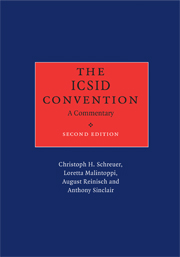Book contents
- Frontmatter
- Contents
- Foreword by Professor Sir Elihu Lauterpacht, CBE, QC
- Authors' preface to the second edition
- Table of cases
- List of abbreviations
- Text of the ICSID Convention
- Procedural calendar
- PREAMBLE
- CHAPTER I International Centre for Settlement of Investment Disputes
- CHAPTER II Jurisdiction of the Centre
- CHAPTER III Conciliation
- CHAPTER IV Arbitration
- CHAPTER V Replacement and Disqualification of Conciliators and Arbitrators
- CHAPTER VI Cost of Proceedings
- CHAPTER VII Place of Proceedings
- Article 62 Proceedings at Seat of Centre
- Article 63 Proceedings at Another Place
- CHAPTER VIII Disputes between Contracting States
- CHAPTER IX Amendment
- CHAPTER X Final Provisions
- Final Clause
- Consolidated bibliography
- Index by article
- Index by subject
Article 62 - Proceedings at Seat of Centre
from CHAPTER VII - Place of Proceedings
Published online by Cambridge University Press: 07 September 2010
- Frontmatter
- Contents
- Foreword by Professor Sir Elihu Lauterpacht, CBE, QC
- Authors' preface to the second edition
- Table of cases
- List of abbreviations
- Text of the ICSID Convention
- Procedural calendar
- PREAMBLE
- CHAPTER I International Centre for Settlement of Investment Disputes
- CHAPTER II Jurisdiction of the Centre
- CHAPTER III Conciliation
- CHAPTER IV Arbitration
- CHAPTER V Replacement and Disqualification of Conciliators and Arbitrators
- CHAPTER VI Cost of Proceedings
- CHAPTER VII Place of Proceedings
- Article 62 Proceedings at Seat of Centre
- Article 63 Proceedings at Another Place
- CHAPTER VIII Disputes between Contracting States
- CHAPTER IX Amendment
- CHAPTER X Final Provisions
- Final Clause
- Consolidated bibliography
- Index by article
- Index by subject
Summary
INTRODUCTION
General
Art. 62 is the first of two Articles in the Convention's Chapter VII on “Place of Proceedings”. Art. 62 sets out the basic rule. Art. 63 provides for variation by agreement of the parties subject to certain conditions.
Other instruments governing international arbitration typically provide that, in the absence of an agreement by the parties, the tribunal shall fix the place of arbitration.
Unlike in arbitration governed by other regimes, the place of arbitration under the ICSID Convention has little legal relevance. ICSID arbitration and conciliation are entirely self-contained and insulated from the legislation at the place of proceedings. The procedure is governed exclusively by the Convention and its ancillary rules (see Art. 44, paras. 3, 21, 54). Any provisional measure is to be recommended by the tribunal under Art. 47 and not by local courts except in the unusual situation of an agreement of the parties under Arbitration Rule 39(5) (see Art. 26, paras. 176–178, 181–183). The law applicable to the merits of the dispute is governed by Art. 42 and is independent of the place of proceedings (see Art. 42, paras. 20–22).
- Type
- Chapter
- Information
- The ICSID ConventionA Commentary, pp. 1244 - 1249Publisher: Cambridge University PressPrint publication year: 2009



